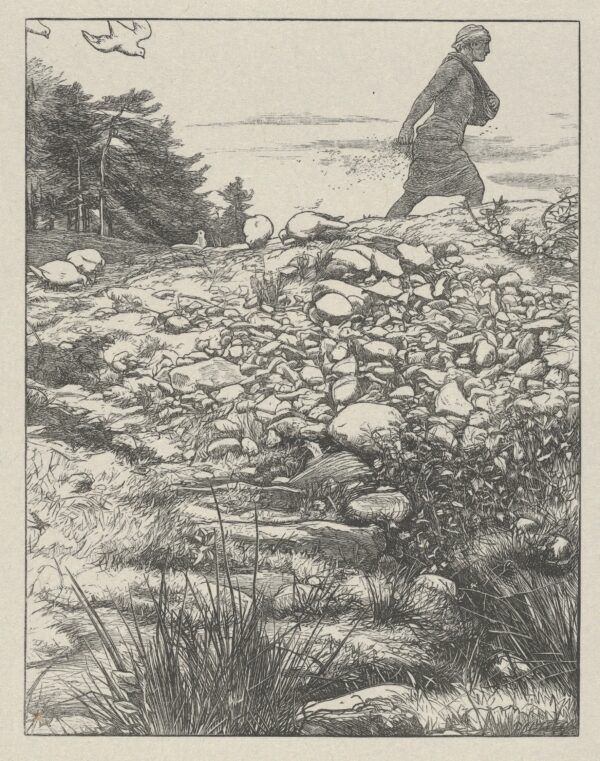A Homeschool Parable
Many parents consider homeschooling, believing it to be a good way to center their children’s education in God’s will, but some get waylaid along the way.
In Mark 4, Jesus told the Parable of the Sower. Jesus said:
“Listen to this!
Behold, the sower went out to sow;
as he was sowing, some seed fell beside the road,
and the birds came and ate it up.
Other seed fell on the rocky ground
where it did not have much soil;
and immediately it sprang up
because it had no depth of soil.
And after the sun had risen, it was scorched;
and because it had no root, it withered away.
Other seed fell among the thorns,
and the thorns came up and choked it,
and it yielded no crop.
Other seeds fell into the good soil,
and as they grew up and increased,
they yielded a crop and produced thirty, sixty, and a hundredfold.”
And He was saying, “He who has ears to hear, let him hear.”
Mark 4:3-9
When Jesus and His followers were alone, His followers wanted to know the meaning of the parable. Jesus explained that the four soils represented different ways that people respond after they have an opportunity to hear the Word of God. See Mark 4:1-20.
The Parable of the Sower is my inspiration for this homeschool “parable.” Jesus’ parable was, of course, perfect. He was addressing choices that affected people eternally. My parable is just my attempt to get us thinking. I don’t mean at all to imply that everyone must homeschool to be acceptable to God. Again, it is simply an attempt to get us thinking.
A Homeschool Parable
Consider four categories of parents who encounter the idea of homeschooling.
- Some parents hear about homeschooling, but give up the idea without ever giving it a try.
- Some parents begin to homeschool enthusiastically, but when they encounter challenges, they give up.
- Some parents start homeschooling with deep commitment and enthusiasm, but, as they homeschool year after year, they worry about whether they can provide what the world says that they should provide for their children, especially when they look ahead to high school. They start missing the luxuries they once enjoyed when both parents were working full-time.
- Other parents have homeschooled for many years. They have faced many challenges but have stuck it out year after year. Though they have made mistakes, they have tried hard to protect their children from worldliness. By God’s grace, their homeschool bears godly fruit—some thirty-fold, some sixty, and some one hundred.
Precious Mama, you have been homeschooling for several months now during this school year and perhaps for several years before that. Are you tired? Are you tempted to let thorns get in your way?
British artist Sir John Everett Millais took seven years to design a beautiful series of 20 illustrations, entitled The Parables of Our Lord and Saviour Jesus Christ for British engravers, the Dalziel Brothers. After creating the designs, Millais transferred them to a woodblock coated with a material called Chinese white. The Dalziel Brothers then carved the designs for engraving. I hope to share more of these beautiful engravings in the future. Millais’ illustration of “The Sower” depicts the unproductive soils Jesus mentioned in the parable.
 Wood engraving; proof on India paper of “The Sower” by Sir John Everett Millais (British, Southampton 1829–1896 London) from the series The Parables of Our Lord and Saviour Jesus Christ, engraved by the Dalziel Brothers and published in 1864. Courtesy of The Metropolitan Museum of Art, New York, Rogers Fund, 1921.
Wood engraving; proof on India paper of “The Sower” by Sir John Everett Millais (British, Southampton 1829–1896 London) from the series The Parables of Our Lord and Saviour Jesus Christ, engraved by the Dalziel Brothers and published in 1864. Courtesy of The Metropolitan Museum of Art, New York, Rogers Fund, 1921.
Parents use a variety of ways to encourage their children to live their lives for God. Ray’s and my personal experiences taught us that homeschooling is an excellent way. We tried homeschooling, public school, and a private Christian school in a sincere attempt to rear godly children. When we finally relaxed and made homeschooling a part of who we were as a family, instead of a burden we strapped on, we became convinced that if we could have the opportunity to rear our children again, we would have never educated them in any other way than homeschooling. It is with a heart of understanding and compassion that I share my “parable” with you today.
The things that got in the way of living a Christian life in the parable of the soils were rocks and thorns–neither of which are welcome when someone is trying to grow things. It may help you to throw away some heavy rocks, such as curriculum that just doesn’t work for your family or activities that are more burdens than blessings or fear about what other people think about the way you homeschool. Perhaps you need to weed out some thorns. Maybe you need to accept prayerfully and gratefully that God is blessing your homeschool with a thirty-fold yield instead of worrying because your children’s yield is not one hundred.
I love you and admire you. I trust your ability to throw out any rocks and thorns that may have gotten in your way. I know God is for you, so who can be against you?
What then shall we say to these things?
If God is for us, who is against us?
Romans 8:31

